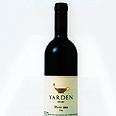
But did you also know that kosher wine has come so far there now are even super-premium bottles that go for more than $100 a bottle?
"It's absolutely amazing how it's evolved," says Michael K. Bernstein, owner of The Cask in Los Angeles, which stocks and sells exclusively kosher wines and spirits. "It's mind-boggling how many different kosher wines there are."
The syrupy kosher wines of the past stemmed mainly from economics. Jewish immigrants to America needed wine, a crucial part of their religious traditions, but didn't have access to high-quality grapes. So they used the Concord grapes that grow in the Northeast, producing wines with an unpleasant character, usually describe as "foxy," which was masked by adding sugar.
But in recent years, a number of producers have begun making classic red and white kosher wines. A pioneer was Herzog Wine Cellars in Southern California, and there also is a growing wine industry in Israel.

'The ingredients in wine are kosher; the trick is to keep things that way' (Archive photo: AP)
Making wine kosher isn't particularly hard, says Jeff Morgan, winemaker at Covenant, a winery in the Napa Valley that makes a kosher cabernet sauvignon that goes for $90 a bottle. The ingredients in wine are kosher; the trick is to keep things that way.
The basic requirement for doing that is to make sure that the grape juice and fermented wine is only touched or handled by Sabbath-observant Jews, which is what happens at Covenant, where associate winemaker Jonathan Hajdu is a Sabbath-observant Jew.
Big leap
Covenant is co-owned by Morgan, his wife Jodie Morgan, and Leslie Rudd, owner of Rudd Vineyards & Winery, also in the Napa Valley, and chairman of the Dean & Deluca upscale delicatessen chain. Morgan and Rudd are Jewish, though neither considered themselves particularly religious when they started the project. Interestingly, making the wines has brought both of them more in touch with their heritage "and that has been a wonderful surprise," Morgan says.
Covenant wines are not "mevushal," a term that means the finished wines have been heated, making it possible for them to be handled by non-observant Jews and remain kosher. In the old days, that used to mean boiled, which is ruinous to wine. These days, winemakers use flash pasteurization. There's debate over whether this does or doesn't affect the quality of a wine, but Morgan is on the side of the doubters and doesn't do it.
Other than that, Covenant wines, consistently praised by critics, are made like other premium wines – with high quality grapes, natural yeast fermentation, no filtration and French oak aging. Production is about 3,000 cases a year and the wines are sold in at least 20 states and several countries, including Canada, Israel, England, France and China. In addition to the flagship Covenant and Solomon wines, Covenant makes a few other wines, including the cleverly named Red C, a red blend with a big red "C" on the label, which goes for around $45.
Even that's a big leap from the old-school kosher wines that go for under $7 a bottle.
When he started making Covenant wines a decade ago, Morgan was confident he could make great wine that was kosher, "but I didn't know that our wines would be so well received in both the Jewish world and the non-Jewish world. That has been very gratifying because it's nice to know that the whole world realizes that kosher wine can also just be great wine."
Morgan didn't just have to win over outsiders. Even though Rudd was a huge supporter of the project, it took six years before he began putting grapes from his very high-end Rudd vineyards into the wines. Those grapes now go into Covenant's Solomon Lot 70 cabernet, which refers to Rudd's Hebrew name. The wine is made in very limited quantities and costs $150 a bottle.
Other premium kosher wines include Herzog, which in addition to a wide line of affordable bottles has a limited edition Generation VIII Cabernet Sauvignon from Napa's famous To Kalon vineyard that goes for close to $200 a bottle.
Bernstein has one wine, the 2003 Chateau de Valandraud kosher wine from the Bordeaux region of France that fetches as much as $500 a bottle.
Passover begins at sundown March 25 this year and for the four cups of wine served at the Passover Seder (the special dinner that begins the holiday), Morgan will be serving different vintages of Covenant wine. His family also will be enjoying other kosher wines.
Bernstein, who remembers a lot of Seders where the wine was sweet and bubbly and just something you drank to be done with, has introduced his family to premium kosher wines. And that has changed their approach to it. "They're not just looking to get by with four cups of wine, they're looking to get good wine for those four cups."
For more kosher wine options, master sommelier Richard Betts has these suggestions:
From France
- Chateau Giraud Sauternes, Kosher Edition
- Chateau Pontet-Canet, Pauillac, Kosher Edition
- Laurent-Perrier, Champagne Brut NV Kosher Version
From Israel
- Castel, Grand Vin Castel
- Recanati Wild Carignan Reserve
- Yarden Merlot
From the US
- Prix Vineyards Reserve Syrah
- From Spain
- Elvi Wines EL26 Priorat















